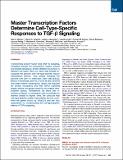Master Transcription Factors Determine Cell-Type-Specific Responses to TGF-β Signaling
Author(s)
Mullen, Alan C.; Orlando, David A.; Newman, Jamie Jennifer; Loven, Jakob; Kumar, Roshan M.; Bilodeau, Steve; Reddy, Jessica; Guenther, Matthew G.; DeKoter, Rodney P.; Young, Richard A.; ... Show more Show less
DownloadMullen-2011-Master Transcription.pdf (1.530Mb)
PUBLISHER_POLICY
Publisher Policy
Article is made available in accordance with the publisher's policy and may be subject to US copyright law. Please refer to the publisher's site for terms of use.
Terms of use
Metadata
Show full item recordAbstract
Transforming growth factor beta (TGF-β) signaling, mediated through the transcription factors Smad2 and Smad3 (Smad2/3), directs different responses in different cell types. Here we report that Smad3 co-occupies the genome with cell-type-specific master transcription factors. Thus, Smad3 occupies the genome with Oct4 in embryonic stem cells (ESCs), Myod1 in myotubes, and PU.1 in pro-B cells. We find that these master transcription factors are required for Smad3 occupancy and that TGF-β signaling largely affects the genes bound by the master transcription factors. Furthermore, we show that induction of Myod1 in nonmuscle cells is sufficient to redirect Smad3 to Myod1 sites. We conclude that cell-type-specific master transcription factors determine the genes bound by Smad2/3 and are thus responsible for orchestrating the cell-type-specific effects of TGF-β signaling.
Date issued
2011-10Department
Massachusetts Institute of Technology. Department of Biology; Whitehead Institute for Biomedical ResearchJournal
Cell
Publisher
Elsevier B.V.
Citation
Mullen, Alan C., David A. Orlando, Jamie J. Newman, Jakob Lovén, Roshan M. Kumar, Steve Bilodeau, Jessica Reddy, Matthew G. Guenther, Rodney P. DeKoter, and Richard A. Young. “Master Transcription Factors Determine Cell-Type-Specific Responses to TGF-β Signaling.” Cell 147, no. 3 (October 2011): 565–576.
Version: Final published version
ISSN
00928674